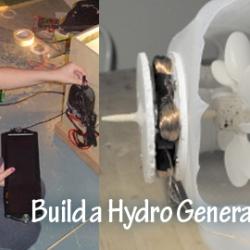Source Institutions
Source Institutions
Add to list Go to activity
Activity link broken? See if it's at the internet archive

Learners follow directions to construct a water-powered electrical generator using a turbine made from plastic spoons. The model generates a surprising amount of electricity, enough to light a small light bulb, and closely resembles real micro-hydro designs. Use this activity to introduce learners to renewable energy and water as a source of energy. Main webpage includes links to other related resources. Adult supervision recommended.
- 5 to 10 minutes
- 1 to 2 hours
- $10 - $20 per student
- Ages 11 - 18
- Activity, Model
- English
Quick Guide
Materials List (per student)
- Electric drill with 1/4 in. drill bit
- Scissors
- Electrical tape
- Ruler
- 10 cm (3.5 inch) nail or awl
- Hot glue gun with 3 glue sticks
- White glue
- Utility knife
- Pencil sharpener
- Permanent felt tip marker
- Magnetic compass
- Wire cutters
- Gloves
- Safety glasses
- Paper templates
- 4L plastic jug (rectangle style, from vinegar, windshield washer fluid, or similar-see illustration)
- 10 plastic spoons
- 1 large cork (3.5 to 5 cm)
- Enameled magnet wire, 24 gauge (approx. 100 m)
- Foamcore or heavyweight corrugated cardboard (approx. 22 cm by 30 cm)
- 6 mm (1/4 in) diameter wooden dowel (20 cm long)
- 4 ceramic or rare-earth magnets (18mm or larger)
- Clear vinyl tubing (6 cm long, 1/4 in inside diameter)
- 4 brass paper fasteners
Subjects
-
Earth and Space Science
-
Earth Structure
- Oceans and Water
-
Earth Structure
-
Engineering and Technology
-
Engineering
- Electrical Engineering
- Environmental Engineering
- Technology
-
Engineering
-
Physical Sciences
-
Electricity and Magnetism
- Electric Charges and Currents
- Electromagnetic Fields
- Electric Circuits
-
Energy
- Work and Machines
-
Motion and Forces
- Machines
- Rotation Motion
-
Electricity and Magnetism
-
The Nature of Technology
-
Technology and Society
- Technology and the Environment
-
Technology and Society
Informal Categories
- Model Building
- Nature and Environment
Audience
To use this activity, learners need to:
- see
- touch
Learning styles supported:
- Uses STEM to solve real-world problems
- Involves hands-on or lab activities
Other
Components that are part of this resource:
- Water Power Backgrounder
- Hydroelectric Generator Template
- Renewable Energy Basics Backgrounder
- Other Clean Energy Technologies Backgrounder
This resource is part of:
Access Rights:
- Free access
By:
Rights:
- All rights reserved, GreenLearning Canada, 2011
